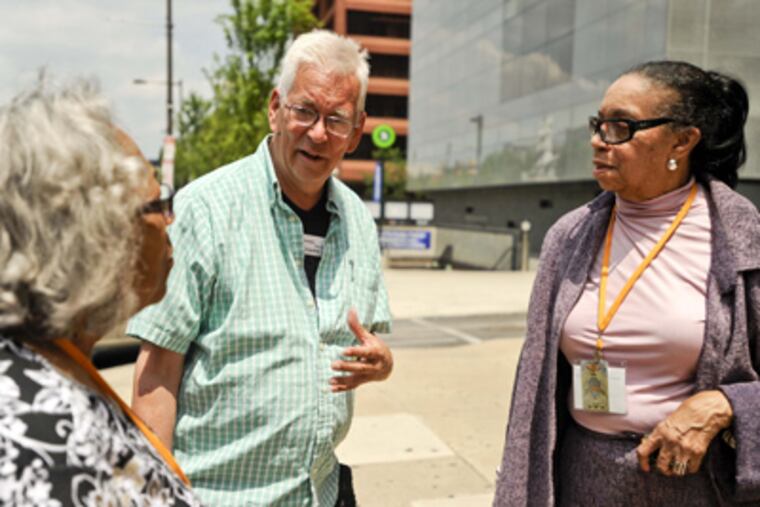Philly group has begun certifying on its own
Not all tour guides hold truths to be self-evident

On the east side of the National Constitution Center, where a copy of the country's birth certificate rests in a glass case, Richard Frey squints under the hazy sun, looking for his day's first tour, which is a few minutes late.
Buses pull in and out of the parking strip, most unloading grade schoolers in matching T-shirts followed closely by chaperones. Frey is waiting on a travel club, a group of women from Chicago who spent the night in the glitz of Atlantic City before coming to see America's birthplace.
Frey, 67, a chatty, soft-spoken man with a head of gray hair, comfortable shoes, and a bottle of water tucked in his pocket, has been a city tour guide for 15 years. He guides welcome tours and specialized tours, from trolleys, chartered buses, double-deckers, and storied sidewalks. The summer season can bring him four 90-minute tours a day, five days a week, when he revives a rich tapestry for hundreds of visitors.
Three years ago, after complaints that some tour operators dotting Independence Hall were giving an unauthorized, revisionist history, a group formed the Association of Philadelphia Tour Guides. Frey joined his brethren, about 80 members, about a year ago. Last month, the organization issued its first exam to certify their skills.
Most passed the test.
"This was a way to make sure tour guides were educated," says Frey, "that if they didn't have an answer, just not make up something."
In 2008, Mayor Nutter signed a bill requiring tour guides to pass a history test, a common practice in cities such as Washington and Savannah, Ga. Three operators challenged the law in federal court on free-speech grounds. This year, a judge dismissed the case. The city didn't have the financial resources to implement the test, making the case moot.
"But it's something we believe in very strongly," says City Representative Melanie Johnson. "If you take a trip here from Arkansas, and someone gives you the wrong date for the Liberty Bell . . . Philadelphia is a historic city, and there are certain facts that everyone should be aware of that highlight for our visitors, even our residents, our national treasures."
Once a month, the Association of Philadelphia Tour Guides meets at the Dark Horse Pub in Society Hill, "creating a spirit of patriotism," says president Bob Skiba, among bus tour guides, independent guides and those working for companies, reenactors, carriage drivers, docents, site managers, and volunteers. It has published a handbook on more than 180 of the city's historic figures, places, moments, artistry, and architecture, from the prominent to the obscure, from 18th-century neighborhoods to Center City skyscrapers. The association also offers a seven-week training course, in the parlor of the Physick House in Society Hill, and its own voluntary certification exam.
"They get it," Councilwoman Blondell Reynolds Brown, who introduced the 2008 bill, said of the group. "If we are going to be true to Philadelphia's history, those that are relaying it need to be professional and informed."
Last month, at Christ Church Neighborhood House on North American Street, 31 operators took the exam. They pored through 100 questions and four visual identifications that tested knowledge such as: What wealthy sailmaker became a leading Philadelphia abolitionist? What is the tallest building in Philadelphia? Charles Weisgerber's painting made which revolutionary woman famous?
All but two passed.
Trevor McElroy, 26, said he had taken the exam for the challenge and the prestige. He wears his certification pin - a gas lantern - on every tour.
"It's so nice to meet people from all over," said McElroy, a guide for five years, "and know we're helping them form an opinion of the city for the better. And just making them happy."
The next exam is scheduled for Thursday. The fee is $35, for first-timers.
Frey, an avid reader who lives near Fitler Square with his wife of 32 years, will sit among the takers.
"I'm confident," he says, standing by the curb of the Constitution Center, but also "a little nervous."
Before long, a red-white-and-blue bus pulls up. About two dozen women get off and stretch their legs. Frey's passengers have arrived.
Virginia Meeks, a petite woman with a beaming smile, describes herself as a "world traveler."
"I go everywhere," more so since she recently retired, she says. "This is how I get my history. When I was in school, it didn't mean anything. Now it's an adventure." This is her first time in Philadelphia.
Riding shotgun, Frey will guide the women through Ben Franklin's map, telling stories about Old First Reformed United Church of Christ, where the British army treated its wounded during the Revolution; Elfreth's Alley, the oldest continuously inhabited street in the country; and Betsy Ross' elopement.
He'll make his way to Penn's Landing and City Hall. But Frey begins with a simple question:
"Hello, folks," he says warmly over a microphone as the bus rolls off. "Welcome to the great city of Philadelphia, the City of Brotherly Love."
"Yeah!" a few women shout.
"You know how it got that name?"